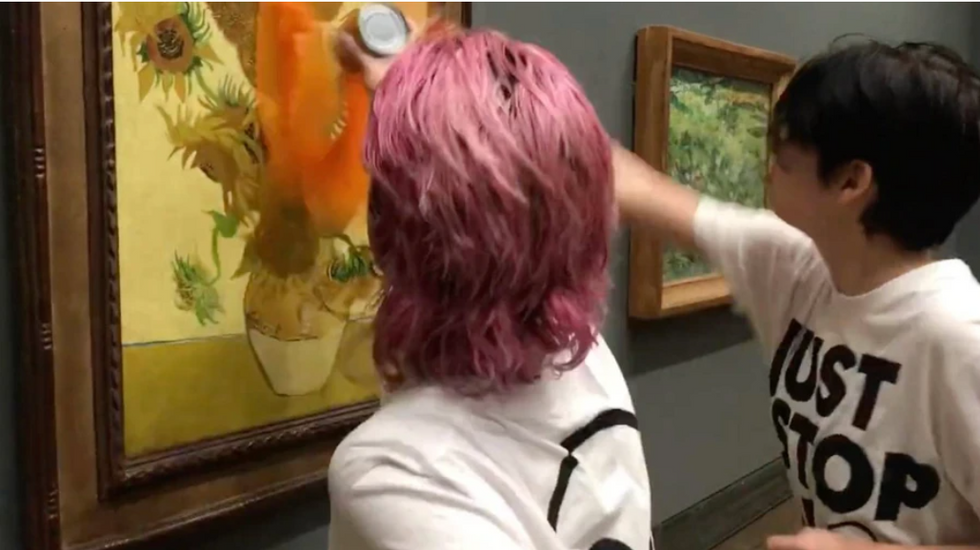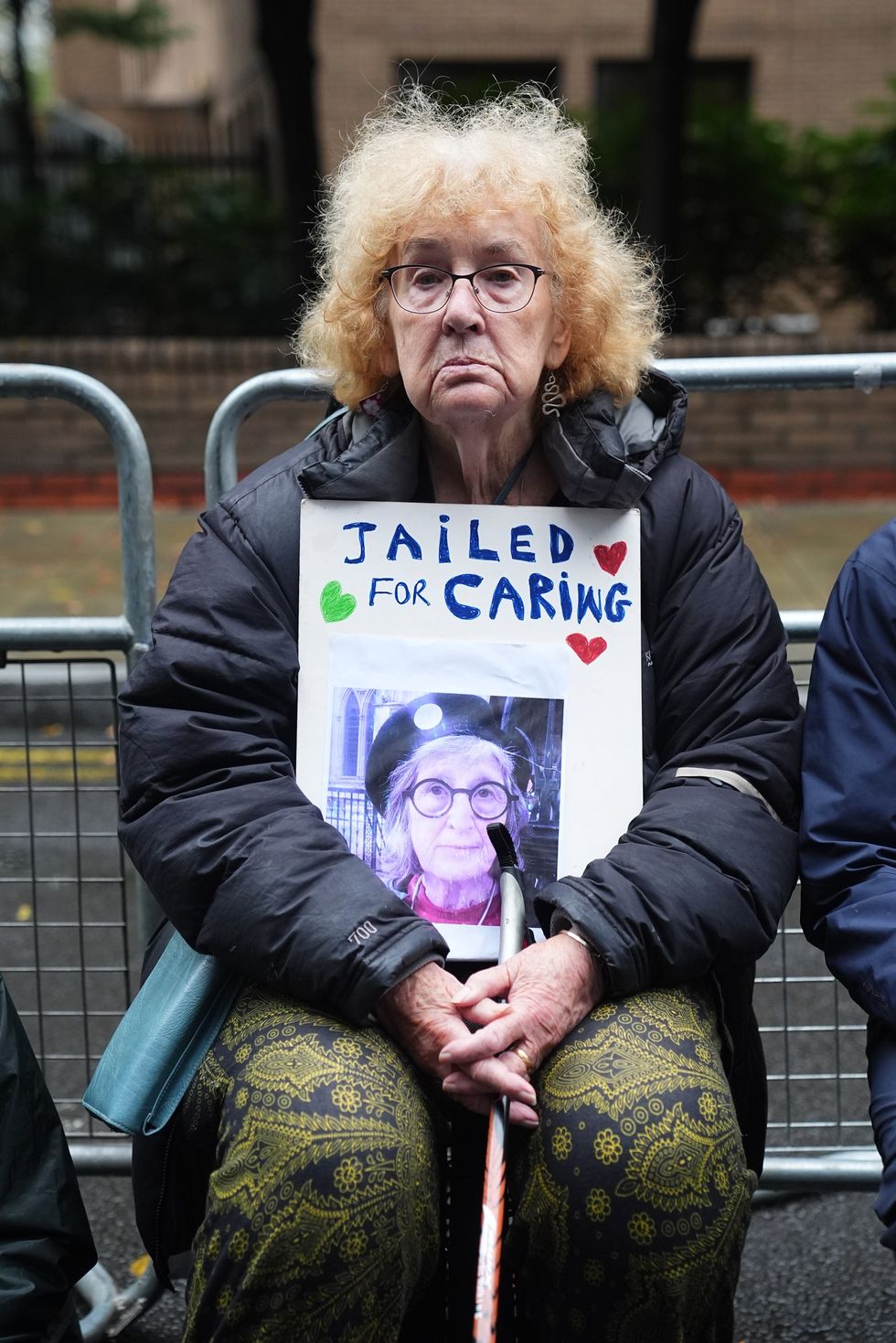Two Just Stop Oil activists have been imprisoned for what the judge described as “idiotic” criminal damage on the “priceless” Van Gogh painting Sunflowers.
Describing their behaviour as “extreme, disproportionate, and criminally idiotic,” Mr Justice Hehir sentenced Phoebe Plummer and Anna Holland to 27 months and 20 months respectively.
Just Stop Oil activists Phoebe Plummer, Anna Holland, Chiara Sarti and Daniel Hall were all sentenced at Southwark Crown Court for two separate cases.
Plummer and Holland were convicted of criminal damage for throwing soup at Van Gogh’s ‘Sunflowers’ painting.

Phoebe Plummer and Anna Holland were sentenced to 27 months and 20 months respectively
Just Stop Oil
The two activists threw two tins of tomato soup at the iconic painting at the National Gallery in London. They later glued their hands to the wall beneath it.
They were convicted for criminal damage after the 17th-century Italian frame was affected by the soup.
Sarti and Hall were sentenced separately for ‘slow marching’ down a road for 20 minutes. Plummer was also part of these proceedings.
The three were found guilty in a landmark case under Section 7 of the new Public Order Act 2023.
They were convicted of “interference with key national infrastructure” by marching slowly down Cromwell Road in West London.
On 15 November last year, Plummer, Sarti and Hall took part in a slow march protest to call on the government to end all oil and gas licenses.
The protest caused delays all the way back from Earls Court to the Hammersmith flyover, lasting several hours.
All four defendants arrived in court to waves from supporters in the public gallery.
Addressing Sarti and Hall first, Judge Christopher Hehir referred to a lack of remorse in Sarti’s pre-sentence reports.
He added that Sarti clearly thought that breaking the law in order to support her views was “just fine and dandy.”
The defence barrister said that remorse is difficult in this case due to their beliefs that there is an “existential threat to the planet.”
The judge hit back: “Beliefs aren’t the problem, it’s the crime that’s the problem.”
Mr Justice Hehir said that anyone caught up in the Just Stop Oil activists could well be “alarmed, distressed, or both, or feeling harassed.”
Hall avoided a custodial sentence and was imposed a community order.
Hall said that he was a self-employed food grower, earning an average of £200 a month. He said that he didn’t expect to find himself in court for his protest and that he didn’t propose to take part in any further actions.
Referring to a proposed criminal behaviour order, Mr Justice Hehir said: “I do have a fear that your clearly very strongly held beliefs may tempt you into crime again.”
Hall responded that “having to kiss my children goodbye today” made him realise “I won’t cross that line again.”
In his sentencing remarks to Sarti and Hall, Mr Justice Hehir said that Just Stop Oil had been responsible for a “great deal of disruptive and illegal protest.”
The protest was chosen to “maximise disruption.”
Traffic was at the height of the disruption backed up along the three-lane road all the way to the Hammersmith flyover.
He added that “Many people were adversely affected” by the “pointless, self-absorbed, self-righteous lawbreaking.”
Mr Justice Hehir said that cars beeping were unlikely to have been “toots of solidarity.”

They were convicted for criminal damage after the 17th-century Italian frame was affected by the soup
Just Stop Oil
The maximum sentence for this protest is 12 months imprisonment, but the judge said he had “drawn back” from a custodial sentence as neither of the defendants had relevant criminal backgrounds.
Sarti also spent 18 days in prison on remand before being granted bail.
The judge said that both had said they no longer wish to take part in breaking the law in support of their sincerely held beliefs on climate change. Hall received a community Order of 12 months and 100 hours of unpaid work.
A Criminal Behaviour Order was also passed to both defendants. They were also ordered to pay £500 in the cost of sentencing.
Sarti was also given a rehabilitation activity of 15 days.
The judge said: “Despite what you said about not wishing to reoffend, your pre-sentence report indicates a certain lack of remorse. This additional requirement will give you a chance to reflect and reconsider your outlook.”
During pre-sentencing proceedings for Holland and Plummer, the court heard discussion on the extent of the damage to the painting and its frame.
Mr Justice Hehir said that the gallery staff “didn’t sit around drinking coffee,” adding that they “immediately took it away to see if the actual painting had been damaged.”
The court heard that the head of conservation said the consequences could have been “very serious indeed.”
The judge said: “Stupidity like this can lead to more and more intrusive security measures. In some cases it may mean that specific works of art get withdrawn from public view.”
Plummer, representing herself, made a pre-sentencing speech: “I made those choices because I believe that non-violent civil resistance is the best if not only tool that people have to reduce … the accelerating climate emergency.”
Plummer, who was educated at St Mary’s School in Ascot, lamented the “political decisions which are being made that pour fuel on the flame and which are sentencing us all to a catastrophic future.”
Plummer said she would accept any sentence with a smile, “knowing that I have done what I can to prevent countless millions of innocent people suffering and dying.”
She said that climate change was the greatest existential threat to human life but it was deemed “irrelevant” to the court.
She continued that the “threat” was not irrelevant to those dying of famine in Sudan, fleeing floods in Europe, and pensioners choosing between eating and heating.
In a passionate address where her voice occasionally wavered, Plummer claimed it was clear that we do not live in a “free and functioning democracy,” and lamented the “broken two-party system.”
Mr Justice Hehir interrupted the speech after she referred to “political prisoners.”
The judge said it was an “offensive comparison” to say that we have “political prisoners” in England, where there are those in “dungeons” around the world.
He said “this isn’t helping you Miss Plummer, you may be playing to an audience, but it won’t help you.”
She then went on to say that she was “so grateful” that people broke the law to fight for research into AIDS treatment, making a comparison between how that disease killed people and how oil and gas is killing people today.
Turning to her conviction for “slow marching,” she said it would impact those who may peacefully march against the “genocide of Palestinians” and those who may peacefully march for “any political choice.”

People protested outside Southwark Crown Court in favour of the two women
PA
She added: “A prison sentence for a peaceful march is a deathly blow to democracy.”
In his sentencing remarks, Mr Justice Hehir said that the pair vandalised the painting in “quite extraordinary fashion.”
Noting the social media broadcast and filmed speech by Plummer, the judge said: “Publicity was your goal.”
Referring to the damage, the judge said: “It is a 17th century antique Italian frame, in a simple rustic style. It was purchased in 1999 for £6,500.
“The frame was chosen because it was the sort of frame that Van Gogh would have favoured. The frame was permanently damaged by your idiotic actions.”
He added that the patina, gained through age, had been removed.
The judge said that the frame was repaired by gallery staff, but the damage was done.
The stance of each of your at trial was a blithe dismissal of the risks involved in what you did.
He continued: “Each of you claimed to care about ‘Sunflowers,’ I reject that. You couldn’t have cared less if the painting was damaged or not.
“Phoebe Plummer, your words reveal how little the two of you cared about Sunflowers or art generally.”
Mr Justice Hehir said: “Sunflowers is probably priceless in a literal sense.”
The judge said that Vincent Van Gogh was Dutch by birth and lived in France and the painting was now in London, but that “Van Gogh and his work belong to the entire world, it’s part of humanity’s shared cultural treasure.”
He continued: “You had no right to do what you did to Sunflowers. The pair of you came within a thickness of a pane of glass to causing permanent damage.”
He said the damage would have been incalculable. Describing their actions as “extreme, disproportionate and criminally idiotic,” Mr Justice Hehir said: “Your beliefs do not entitle you to commit actions not permitted to others.”
Speaking about Plummer’s mitigation speech before sentencing, he said: “I was treated, if that is the word, to a lengthy ideological speech on climate change and a variety of other matters.”
He continued: “The suggestion that you and others like you” — convicted by juries — “are political prisoners is ludicrous, self-indulgent and offensive.
“Perhaps one day you will come to realise that though I fear that day is far away.”
Plummer said she would take her sentence with a smile, and she was smiling as Mr Justice Hehir sentenced her to two years imprisonment for criminal damage and three months for the “slow marching” conviction for a total of 27 months.
Holland’s mother watched on from the public gallery as the judge referred to her character reference.
Her mother shook her head as the judge said that an immediate custodial sentence was also necessary in her case.
Mr Justice Hehir said he had reduced the length of the sentence due to mitigation, bringing it to 20 months imprisonment.